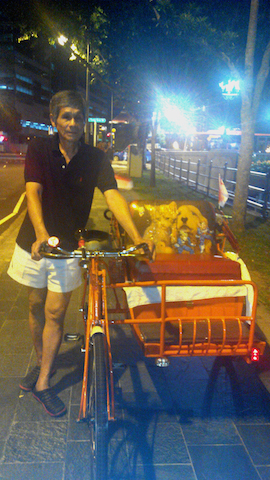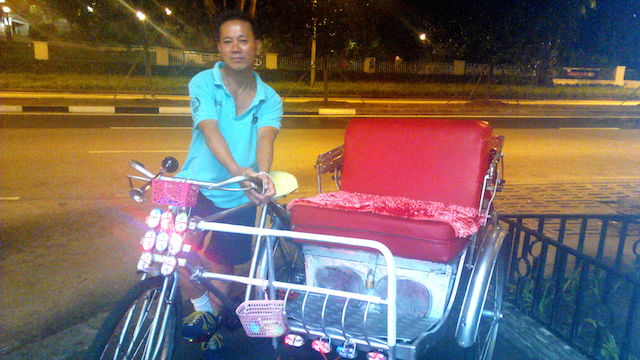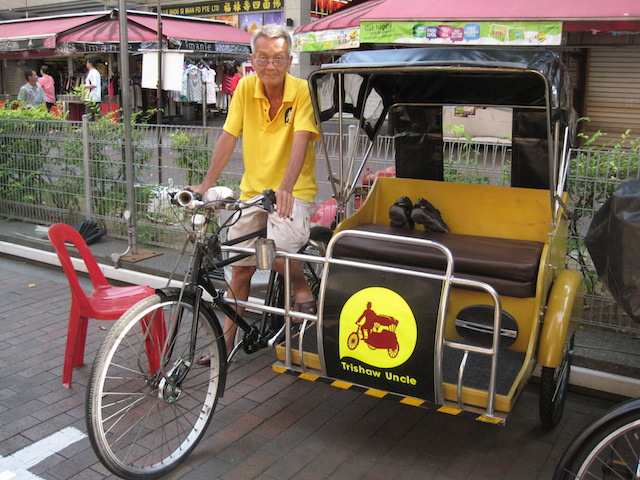Trishaw uncles
Many elderly trishaw drivers are plying the streets of Singapore today – this dying trade requires much strength and stamina, and is no longer as popular as its yesteryears. But these four senior drivers still ride tirelessly day after day, for just enough pocket money to get by.
BY: Candice Neo
For 67-year-old Ong Heng Puk, driving a trishaw is more than just a past-time or an opportunity to earn a bit of pocket money. It’s about keeping fit and satisfying a natural curiosity about life and people.
The full-time cleaner can be spotted at Clarke Quay after work every night, from 8pm till midnight, sitting atop his cheerfully-decorated trishaw that holds two national flags, which flutter in the late evening breeze.
He charges about $15 to $20 per passenger, and gets about one or two passengers a day.
Despite his age and small frame, he admits that driving a trishaw with a passenger who weighs up to 80kg is no difficult feat. “It’s a form of exercise, and keeps me fit and active,” he reveals.
Ong is one of many elderly men who choose to drive trishaws not simply for a living, but to keep active physically and mentally.
These trishaw drivers can be seen plying the roads of Singapore’s heritage, such as Bugis, Little India, Chinatown and Clarke Quay. Most are working under Singapore’s only licensed trishaw operator, Trishaw Uncles, which charges up to $49 a ride, while a few are freelancers who can be seen waiting for customers either near the riverside at Clarke Quay or outside Raffles Hotel.
Another trishaw driver, Liew Chong Fah, the trishaw team leader of Trishaw Uncles, claims that he has not fallen ill since he started riding 15 years ago.
“Driving a trishaw needs a lot of energy and stamina, and it has kept me in good health,” he says. As the trishaw uncles under the operator use motorised trishaws, carrying passengers who weigh up to 400kg is no problem for him, the 63-year-old confesses.
On the other hand, freelance trishaw drivers like Ong do not use motorised trishaws (which can only be ridden by drivers under licensed operators), so it can be physically taxing for them.
A love for meeting new people
A freelance driver, who only wanted to be known as “Mr Heng”, admits that he gets a little exhausted at times, but he shares that he enjoys having his freedom as a trishaw driver while earning his keep at the same time.
The 55-year-old has been driving a trishaw since the factory he was working in shut down eight years ago.
He charges up to $35 for a ride from Clarke Quay to Orchard Road, and sometimes satisfied passengers can tip up to $50.
“What I earn now is about the same as what I used to earn as a factory worker, around $1,400 a month,” Mr Heng says. “But now, I have more freedom to go to work as and when I like, and I have more control over my time.”
Although he can be seen waiting near a taxi stand at Clarke Quay every night, he confesses that the peak period for him are Friday and Saturday nights, during which he can get up to four passengers a day. On some days, he can get no passengers at all.
“Most of my passengers are foreigners, such as Caucasians, Japanese and Koreans,” he says. “It’s a novel experience for them, so they are often curious and want to try it out.
“Sometimes, there’s also the occasional Singaporean young man who wants to impress his girlfriend, and the couple would want to go on a trishaw ride,” he adds. “For these young people in their 20s who didn’t grow up with trishaws in their time, this is also a very interesting experience.”
Parking himself just a few hundred metres away from Mr Heng, Ong quips that he enjoys chatting with his passengers. The former bakery owner bought his trishaw from a friend after his business folded more than 10 years ago, started this new part-time trade (or “hobby” as he calls it), and has never looked back since.
“I like to chat with different people from different countries,” he says. “Sometimes I’ll share about the heritage of a place we are passing, and sometimes I’ll ask them about their lives and start chatting from there. It’s something I really enjoy doing.”
He adds: “Even though sometimes they may be drunk after too much partying, it’s quite funny talking to them, and I feel happy whenever they smile and laugh with me.” He has even picked up English since he started driving the trishaw, as it is the common language he uses with his foreign passengers, who are mainly Caucasians or Indo-Chinese.
Ong isn’t the only trishaw driver who has picked up new languages while on the job.
A fourth trishaw driver, 61-year-old Tan Keng Leng, who also works at Trishaw Uncles, admits proudly that he has picked up Japanese and Korean since he started his trade more than 20 years ago.
The surge in Japanese and Korean tourists flocking to Singapore over the past few years has enabled Tan to pick up the languages by simply listening and chatting with his passengers.
“It’s fun being able to talk to new people, especially people from a foreign land, every day as part of your job,” he says. “And it’s also very relaxing. Nowadays in Singapore, jobs are difficult to come by, not to mention stressful, and everything requires a degree. I only studied in primary school. What else can I do?”
Passing it on to the younger generation?
Despite Tan’s years of experience, his wife still worries for his safety on the road and wishes he would get another job.
“But I enjoy what I’m doing, and don’t really want to make a switch,” he says with a wistful sigh.
Both he and his wife hide the fact that he is driving a trishaw from his children and grandchildren. “I feel that it’s not something that’s very glamorous, so it’s better to not let them know. Plus, I’m earning my own pocket money and am not dependent on my children,” he explains.
On the other hand, for his colleague Liew, the presence or absence of family support matters even less. “I’m single, unmarried with no children, so I have the freedom to do what I like,” he says.
“To me, trishaw riding is just to pastime – and I get to talk to pretty girls too!” he added with a chuckle.
But to some trishaw uncles, the glamour (or lack thereof) of any job is simply a matter of perspective.
Sometimes, having a father (or grandfather) who rides a trishaw can get the younger generation interested in this age-old trade.
For Heng, his two children and two grandchildren (aged three and six) have even ridden on his trishaw before.“They enjoy it very much, and said it’s fun!” he quips. “The young ones really love it a lot.”
The enthusiastic Ong even taught his son, who is currently in his 30s, how to drive a trishaw.
So does he and his son take turns to drive his trishaw? “No lah,” Ong replies with a laugh. “He is too shy!”
With a head of greying hair, Ong still appears energetic for his age, just like many of his trishaw driving peers.
How long more does he actually want to ride for? His answer is the same as the three other trishaw uncles: “For as long as I can ride.”
Because trishaw driving is no longer just a job, but also a way for the seniors to pass their silver years actively and happily, at a slower pace of life that suits them perfectly.
While the bustling crowd rushes by, they sit patiently by their trishaws, watching the sky turn dark and exchanging smiles with passers-by, occasionally striking up a conversation with one another.
“Oh wait – someone’s taking a picture!” the sharp-eyed Ong exclaims, a smile lighting up the corners of his eyes. A young Caucasian man has taken out his camera, and Ong poses obligingly.
The two strangers exchange smiles, and that brief heartfelt moment conveys a warmth that could not be expressed in words.
And for Ong, that moment is reason enough.





0 Comments